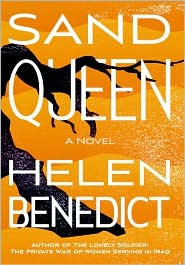
Her wrists are thin, her neck adorned with pearls, her voice soft, her accent British. Helen Benedict could pass for a professor at Columbia University's Journalism masters program, but an anti-war activist with spools of interviews and notes with women from the American military? Unlikely.
Then again so is Columbia's Oral History Masters Program, I'm surrounded by its students waiting to be addressed by Prof. Helen Benedict. Familiarity suspended, I shall let her do the talking.
Her latest non fiction book is THE LONELY SOLDIER, a haunting account of how women soldiers are treated in the American military -- the Air Force, the Navy, the Marines, in school, on tour, everywhere. With her quiet voice she stresses her concerns about the military as a "rape culture" and describes her interactions with the roughly forty women she interviewed when writing the book. Most relationships deepen with time, most interviews become more revealing, but not in this case: Benedict found that her time with these extraordinary women, her questions and prompts, and therefore her voice, became the source of their Post Traumatic Stress Disorders (PTSD). How ironic that in unlocking their voices via hers, Benedict also encouraged the ghastly memories they had stashed away to scream back to life, shattering mental and emotional barriers the woman had constructed in trying to acclimatize to civilianhood.
"What does remorse do to a person," Benedict wonders. What was she to do with the pages of torment she had documented, whose question-and-answer surveys only just scratched the surface of these women's stories? Her answer was to write SAND QUEEN, a fictional story tracing the lives of Kate, an American soldier, and Naema, an Iraqi woman. Benedict knew she had a plethora of detail, but she had to be careful about constructing a landscape she had never encountered, a country she had never visited, and a job she had never held. SAND QUEEN is a work "mostly of my imagination, fed by interviews," she tells us, and remembers how patience and compassion were key to winning the trust of the women she spoke with.
Fiction that is too close to the facts can "hamper imagination" and sound like "thinly veiled journalism," which Benedict wanted to avoid. It would take a fine balance of reality and its riffs to best launch her narrative and she combined her knowledge about and frustration at the war and how it was being handled, with honest questions to a female Iraqi friend: for example, "is my character angry enough." Such research helped her concoct vivid sentences, such as when Naema watches her father and brother being beaten by American soliders and taken away, no reasons given: "That is when I felt the anger grow over me like a skin," Benedict's voice making Naema sound grim.
Trained as a journalist, Benedict revels in fiction because, unlike non fiction, an author can give characters a voice that they do not have yet. One can go deeper into a character's interior, and it is always easier to "lay bare a made up character than a real person." The book is in three sections, each told by a different narrator. There is Kate, Naema, and finally a third person perspective, which is "where I get literary," Benedict explains. Kate is desperate as a prison guard in the middle of a desert, a "grey blur, dusty grey sand obliterating the horizon." Deprived of humanity in her fellow soldiers -- all men -- she befriends and talks to a tree, Marvin, "whose every twisted branch I know." Driving through the charred remains of a freshly bombed city she recalls the "corpses on the side of the road, like deer back home except with human faces." Fiction, Benedict believes, can "can come closer to the truth in profound ways," being the "old fashioned" approach to telling someone's story.
War stories belonged to men first -- Homer, Joseph Heller, Tim O'Brien -- and Benedict is grateful for the women's voices that are entering the genre today. They are still considered "outcasts," but they are an adamant and emerging community, not unlike Benedict and her followers. SAND QUEEN received all kinds of criticism: it was considered "gloomy" and "unpatriotic", not as "authoritative as a man's book," and, worst of all, made the military look bad -- although she has since spoken at West Point and engaged the government in D.C. to advocate better conditions for and treatment of women in the military, with positive responses. Benedict is inspired by the women she has come to know, whose voices and stories float through her mind, and is determined to be "fair and furious" when she writes, for them as survivors and for us as readers.
More details here: http://www.helenbenedict.com/

No comments:
Post a Comment